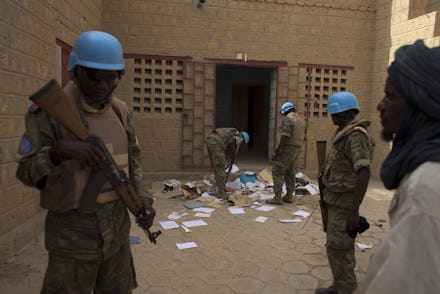The Secret to How Al-Qaeda Balances Its Checkbook

The news: According to a report released Sunday by the Associated Press, far-flung Al-Qaeda militants have something in common with everyday office temps: they're required to submit detailed records of their business expenses, accounting for every tank of gas, bar of soap, tomato, cake, and round of ammunition purchased by the terrorist organization. That is, when they aren't attending scheduled company retreats.
It seems that even hardened jihadists located in remote desert areas aren't exempt from filing cover sheets with their TPS reports.
The background: The AP article suggests that the strict accounting measures it documented in Timbuktu, Mali — which require Al-Qaeda field operatives to create invoices on scraps of paper when receipts are not available — are the direct legacy of Osama bin Laden's strict leadership.
In addition to being a terrorist scourge, bin Laden was a successful businessman, much like his father, who founded the Saudi Binladin Group, a privately-owned construction conglomerate that continues to handle billion-dollar contracts throughout the Middle East. Osama bin Laden studied business administration at King Abdulaziz University before graduating with a degree in civil engineering. After he spent the 1980s funneling funds, arms, and fighters into Afghanistan's war against Soviet Russia, and founded Al-Qaeda in 1988, bin Laden went on to manage his own construction company in Sudan, where he oversaw the construction of roads and bridges while building his terrorist network.
The lists of salaries, job application forms, Excel spreadsheets, deadlines, and years worth of gas station receipts recently detailed by the AP are evidence of bin Laden's lasting influence and organizational skills. After all, while Al-Qaeda operates as a loose "network of networks," it maintains business practices along the lines of what might exist at a Fortune 500 company.
The takeaway: When reading reports of Al-Qaeda affiliates' attempts to institute Sharia law in places such as Timbuktu, it's important to remember that as fastidious as their accounting may be, groups like Ansar Dine and Al-Qaeda in the Islamic Maghreb don't necessarily represent, or have the support of, the Islamic populations that they deign to rule. In fact, the residents of Timbuktu welcomed an intervention by French troops earlier this year that removed Islamist forces from control of northern Mali.
Like any multinational organization, Al-Qaeda inserts itself and its bureaucracy into unfamiliar countries and cultures to expand its influence (per the AP report, "The names on the receipts reveal the majority of the fighters on the group's payroll were foreign-born"). As such, the residents of areas impacted by Al-Qaeda shouldn't be judged by the impact of the terrorist organization. They just may happen to live where the McDonald's of international terrorism is attempting to open a franchise.